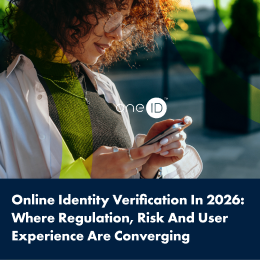As cliché as it sounds, the past 2 years have proved this more than ever. As the pandemic compounds the rate at which our lives move online, it’s been key for online retailers to adjust to this.
Ecommerce as a proportion of total retail sales in the UK reached an all-time high in January this year, with year-on-year growth of 181% and a value of over £3.2bn. Whilst digitisation of all aspects of life has been pushing retailers online for years, it’s safe to say that move has accelerated.
Of course, with change comes challenge.
For retailers moving operations online, or for those beginning their journey in e-commerce, there are certain difficulties they will experience.
From high abandonment rates to indistinct rules and regulations, these challenges test the best of online retailers, who are constantly seeking new solutions to improve the online experience for customers.
Digital identities, collections of personal data that exist about individuals online, have a huge part to play in e-commerce.
Anytime somebody transacts online, they use their digital identity to do so. It makes sense, therefore, that real value exists in paying attention to digital identity technology, and how retailers can utilise it to improve.
OneID® is using Open Banking infrastructure to fuel their digital identity service, OneID®. Building on the already-established open-API model, OneID® lets individuals prove who they are online easily.
Here are a few key areas in which digital identity technology like OneID® can make the lives of e-commerce businesses a whole lot simpler.
For e-commerce stores selling age-restricted goods or services, making sure their customers are the right age can be difficult.
There is a plethora of laws and regulations to follow as an online retailer selling age-restricted items, and verifying age isn’t as easy as handing over your driver’s license to the bartender.
Solutions using digital identity technology, such as OneID®, simplify age verification by using data that already exists, held by banks.
To prove age, without uploading scans of ID documents or filling in lengthy forms, all customers have to do is give their bank permission to share confirmation with a retailer that they are the right age to make a transaction.
The simplicity of this process means there’s no sign-up process, anyone with a UK bank account can verify their age through OneID® immediately.
The process is fast, and e-commerce retailers can be sure they are complying with the law thanks to bank verified data, protecting themselves and their customers.
A new regulation for e-commerce retailers is the Strong Customer Authentication (SCA) requirements, introduced in September.
These requirements aim to reduce credit and debit card fraud through two-factor authentication technology.
Their introduction is hotly debated, as businesses report the required new processes significantly increase friction and frustration for consumers, negatively impacting sales.
Using digital identity services like OneID® in payments achieves the fraud-minimising targets of SCA requirements without compromising on customer experiences and convenience in transactions.
Verifying users through the biometrics they use with their digital banking ensures a level of security in payments, meeting SCA requirements.
For businesses, immediately the benefits of better customer experience are realised; frictionless onboarding and authentications, reducing abandonment, and driving conversions.
Even better, this improved customer experience is achieved without compromising on security and actively achieving safer payments processes.
Across all industries, abandonment in the UK sits at around 82%. In some sectors, it’s higher, and when looking at abandonment on mobile devices it increases yet again.
With mobile now the primary channel for online shoppers, this can’t be ignored by retailers who need to ensure they provide the best online experiences to increase conversion.
Enabling consumers to utilise digital identity in their transactions online creates a smoother onboarding journey.
A zero-data-entry journey is created, removing the need for long, manual sign-ins as well as reducing reliability on social sign-ins that can lead consumers to feel insecure about their data.
With 23% of consumers citing long, complicated checkout processes as their reason for abandoning carts, it’s easy to see how digital identity solutions could make improvements for online retailers who need to know their customers.
Whichever way e-commerce retailers begin to embrace digital identity solutions, it’s clear those who do so earliest will stay ahead of the curve, not just surviving but thriving in such a reactive market.
Guest blog post for techUK - see the original here.

Agentic commerce is already operating inside live retail, payments, and platform environments. For Partn...

Online identity verification entered a new phase in 2025. Across adult platforms, gambling, financial se...

Last month, we joined Turnkey for an industry event to talk about a challenge many regulated platforms a...

2025 has been a year of continued growth and real-world proof for OneID®. As expectations for identity a...